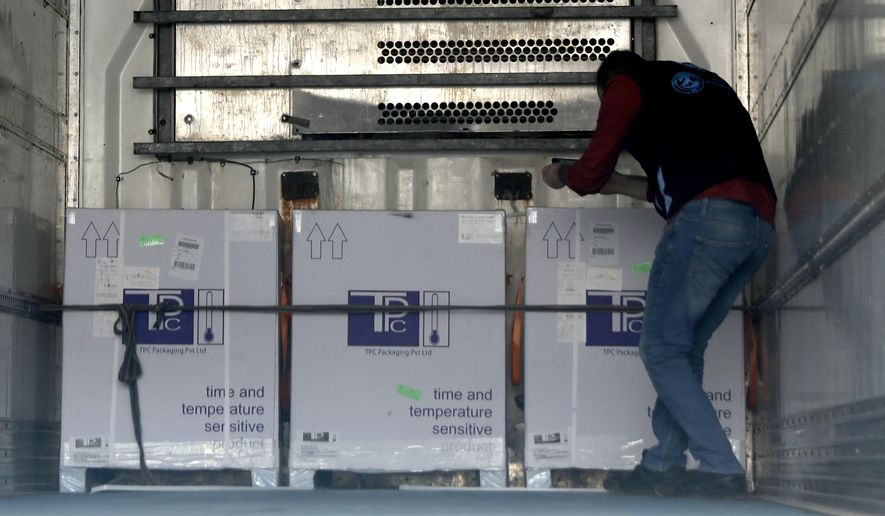IDLIB, Syria (AP) - Syria’s last rebel-held enclave received its first batch of COVID-19 vaccines Wednesday, with a refrigerated truck offloading over 50,000 United Nations-secured jabs in the overcrowded province.
The delivery came hours before a bigger shipment was expected to arrive in the capital Damascus for inoculations in government-controlled areas. The first batch of vaccines comes as the war-torn country experiences a new surge in infections, overwhelming hospitals already reeling from conflict and deteriorating health care services.
The AstraZeneca vaccines were delivered to rebel-controlled Idlib province through a border crossing with Turkey, the northwestern territory’s only gateway to the outside world. Idlib health official Yasser Najib said 53,800 jabs were provided through the U.N.-led COVAX program for the world’s poorest nations.
Given Syria’s ongoing conflict, vaccine delivery is divided - the majority going through Damascus for government-held areas and the rest through the border with Turkey. The U.N. will go through Damascus to deliver over 200,000 jabs to cover government-held areas and Kurdish-dominated territory in the northeast.
The rebel-held region, home to 4 million people, is seeing a new rise in infections. The area houses over 2 million displaced persons who live in tent camps and temporary housing. While fighting has largely subsided, occasional military operations still violate a cease-fire that has been in place since March 2020.
After recording nearly no cases in the past month, infections have risen in northwestern Syria, portending a new surge, said Naser alMuhawish, who works in the labs monitoring cases in the area. Over 21,000 infections and over 640 deaths have been recorded in northwestern Syria.
In government areas, more than 21,000 infection cases and over 1,400 deaths have been recorded.
The situation in Kurdish-held areas in northeastern Syria is fast deteriorating. The International Rescue Committee said in April alone, more than 4,000 infection cases have been recorded - half the total cases from all of 2020.
The World Health Organization had said the vaccination campaign in Syria was expected to start in April and aims to inoculate 20% of the population by the end of 2021.
Officials in government-controlled areas had already rolled out limited vaccinations following an announcement by Damascus in February that it received an undetermined amount of vaccine from an unnamed friendly country. Media reports had said that Israel paid Russia $1.2 million to provide the Syrian government with coronavirus vaccines as part of a deal that secured the release of an Israeli woman held in Damascus.
Separately, the United Arab Emirates said it sent a shipment of COVID-19 vaccine doses that arrived Tuesday in Damascus to help Syria fight the pandemic. It didn’t say how many doses or which vaccine. But the announcement was the latest sign of a foreign policy shift from the Gulf Arab emirate, which had early in the war supported opposition to Damascus.
In recent months, as Syria’s government forces recaptured most of the territory once lost to the opposition, the UAE has made limited diplomatic gestures toward Syrian President Bashar Assad’s government. Another medical shipment from the UAE arrived in Damascus earlier this month.
Najib, the Idlib health official, said the inoculation in northwestern Syria will begin May 1 and use the 53,800 vaccines to administer a first dose to doctors, nurses and frontline aid workers. It was unclear when the next batch would be delivered. The vaccines are stored in a warehouse in a border town.
“We will use the jabs to inoculate 53,800 people,” Najib said, explaining that they will use the whole batch for the first dose.
___
Associated Press writer Sarah El Deeb in Beirut contributed to this report.




Please read our comment policy before commenting.